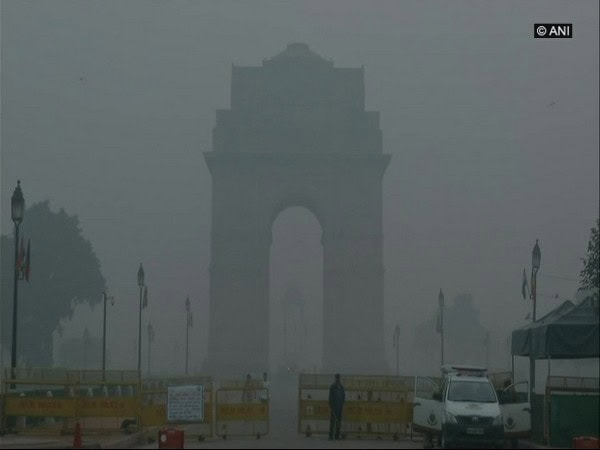New Delhi [India]: As the rising levels of air pollution in the national capital has hit 70 times the World Health Organisation’s safe limit, doctors have suggested people to wear N90 masks whenever they go out, as exposure to air pollution can lead to cancer and heart disease.
The Central Pollution Control Board (CPCB) identified four reasons for the sudden onset of pollution – temperature, wind speed, relative humidity and atmospheric boundary layer – for the worsening Delhi air, the CPCB experts said.
Senior Consultant Chest Medicine Dr. Neeraj Jain from Sir Gangaram Hospital told ANI, “Air pollution consists of visible physical matter, invisible physical matter and chemicals in the form of gases. These affect the respiratory passage beginning from the nose, throat, sinuses – all the way to the lungs.”
“The air we breathe is mainly from the layer around 10 feet above the ground and inhaling directly in this air with a mask can result in life-threatening diseases like cancers, heart disease, kidney disease and others in over a period of time,” Jain added.
Stating that during winters, due to lower temperatures and higher moisture content, the pollutants in the air do not rise to a higher altitude, Dr Jain advised to stay indoor as the ill-effects of pollution are more severe especially during early mornings and late night in this season, while adding that normal surgical masks are useless against protection from air pollution.
When Dr Shaarang Sachdev from the Dharamshila Narayana Superspeciality Hospital in New Delhi was asked about the health hazards of smog, he said, “The fine particles i.e PM (Particulate Matter) 2.5 can penetrate deeply into your respiratory system and PM 2.5 concentrations in winters is significantly higher in comparison to summers, which can lead to eye irritation, wheezing, coughing etc and people with chronic respiratory problems are worst-affected.”
Revealing the four key pollutants, Dr Sachdev said, “Particulate matter (PM), ozone, nitrogen dioxide and sulphur dioxide can cause health risks and premature deaths if the level of toxins increases.”
Emphasising on the need of N95 masks, Dr Sachdev said these masks were considered to be the most advanced as they protected people from the toxic air in a better way.
According to reports, November 8 became the coldest of the season so far with minimum temperature at 14 degree Celsius and November 7 was the second-coldest day of the season with the temperature dropping to 16.1 degrees Celsius.
The Director and HOD, Pulmonology and Sleep Medicine, Dr Manoj Goel, from Fortis Memorial Research Institute in Gurugram, said, “Avoid unnecessary exposure and use N90 masks for safety. People should increase plantation, drink plenty of fluids, eat nutritious diet, avoid smoking, get a vaccination against flu and pneumonia, to protect from the harmful effects of air pollution.”
“To stay healthy, you may try to include vegetables and fruits, high quality protein like soya, tofu, fish, nuts and low fat and low carbohydrate in your diet as it may improve your immunity,” Dr Goel added.
It is advisable to eat home-cooked food and keep windows and doors shut to prevent air pollution from entering your living space, the doctors advised.
With Delhi and the National Capital Region (NCR) facing severe pollution for the third day on Thursday, the National Human Rights Commission (NHRC) issued a notice to the Centre and the governments of Delhi, Punjab and Haryana.
Taking suo motu cognisance of the matter, the NHRC said it was apparent that the authorities had not taken the adequate measures throughout the year and it amounted to the violation of the Right to Life and Health of the NCR residents. (ANI)

